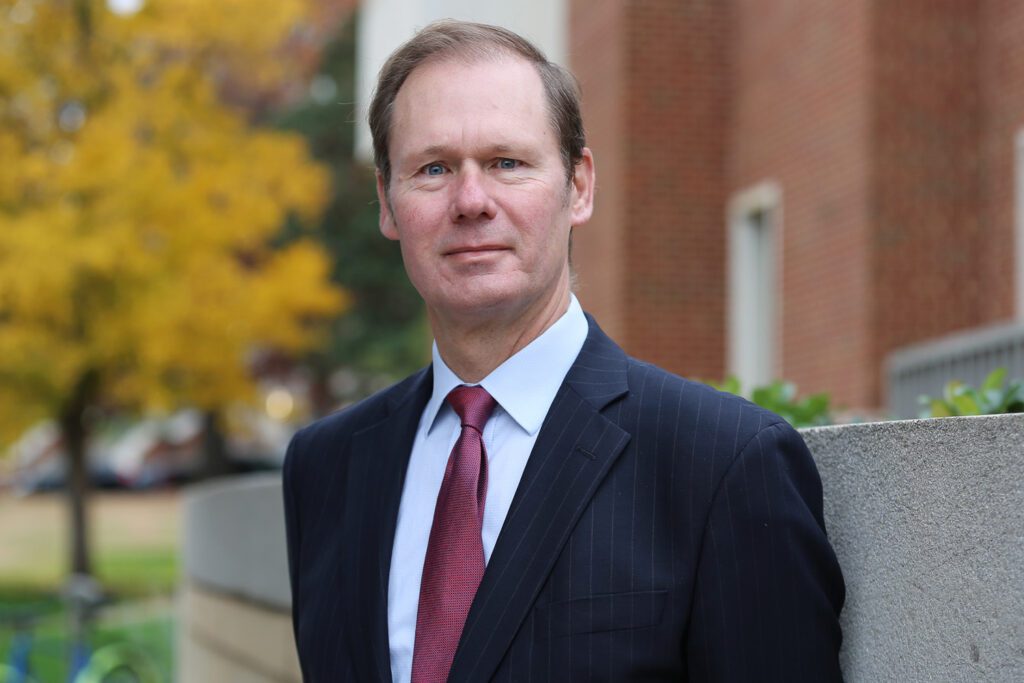During the 2022-23 academic year, Professor Maurice Stucke served as a Senior Policy Advisor at the Federal Trade Commission where he led a global, multi-agency project to explain the relationship between privacy and competition policies. Professor Stucke also helped inform and coordinate competition and privacy policies on three levels: first, across the FTC’s different branches (consumer protection, privacy, and competition); second, with other federal agencies and the White House’s Council of Economic Advisers; and third, with other jurisdictions’ competition agencies. UT Law students were fortunate that Professor Stucke continued to teach while serving at the FTC—he taught an online course each semester.
Professor Stucke was sought out for the advisory role based on his background. He is an expert in and teaches Privacy, Antitrust, Evidence, Business Torts, Consumer Protection Law, and Law & Economics (with a focus on behavioral economics). Prior to joining the legal academy, he spent ten years as a trial attorney in the United States Department of Justice, Antitrust Division, and was also an associate at the law firm Sullivan & Cromwell. Before law school, he served as a Research Assistant in the Office of Consumer Affairs at the U.S. Securities and Exchange Commission.
His scholarship on issues related to competition and privacy was also influential in the decision to ask him to serve as an FTC policy advisor. This scholarship includes the books Breaking Away: How to Regain Control Over Our Data, Privacy, and Autonomy and Competition Overdose: How Free Market Mythology Transformed Us from Citizen Kings to Market Servants (with Ariel Ezrachi).
While at the FTC, Professor Stucke worked with senior policy officials from agencies around the world to draft a handbook to help competition agencies navigate when privacy and competition issues intersect. Rather than give “an” answer, the report instead provides an analytical framework for determining how to account for privacy in a variety of competition areas (such as merger reviews, monopolization claims, and anti-competitive conduct among rivals). The report, which is the first ever to take a comprehensive look at that relationship, includes conclusions and recommendations that are of growing importance as companies increasingly rely on privacy for anti-competitive actions. Although his time with the FTC is complete, the agency has asked him to continue this work as a non-governmental advisor.
In October 2023, Professor Stucke presented the draft report to the heads of over 100 competition authorities at the International Competition Network’s annual conference, held in Barcelona’s historic neoclassical building, the Llotja de Mar. The audiences included the heads of Germany’s and India’s competition authorities, and the former head of the UK competition authority, as well as a panel of European professors and competition officials.
According to Professor Stucke, the report’s findings and framework will likely be updated as we learn more about the intersection between privacy and competition. Moreover, as he testified before the U.S. Senate on October 24, 2023, risks posed by AI will serve to compound the legislative deficit regarding competition and privacy. Professor Stucke is leading the way in calling for updates to the competition laws for the digital economy, as well as basic privacy protections.
His experience at the FTC led Professor Stucke to become an affiliate of the Center for National Security Affairs, housed at the University of Tennessee’s Baker School of Public Policy and Public Affairs. In this role, he will explore the broader legal and policy issues related to AI, which are of critical importance to states, especially Tennessee, given its recent enactment a new privacy statute and leading role in ongoing antitrust cases against Meta and Google.
